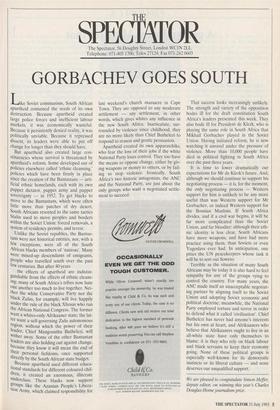THE',
SPECTATOR
The Spectator, 56 Doughty Street, London WC1N 2LL Telephone: 071-405 1706; Telex 27124; Fax 071-242 0603
GORBACHEV GOES SOUTH
Like Soviet communism, South African apartheid contained the seeds of its own destruction. Because apartheid created large police forces and inefficient labour markets, it was economically wasteful. Because it persistently denied reality, it was politically unviable. Because it repressed dissent, its leaders were able to put off change for longer than they should have.
But apartheid also created large con- stituencies whose survival is threatened by apartheid's reform. Some developed out of policies elsewhere called 'ethnic cleansing,' Policies which have been firmly in place since the creation of the Bantustans — arti- ficial ethnic homelands, each with its own Puppet dictator, puppet army and puppet sovereignty — in 1952. To get blacks to move to the Bantustans, which were often little more than patches of dry desert, South Africans resorted to the same tactics Stalin used to move peoples and borders within the Soviet Union: forced removals, a system of residency permits, and terror. Unlike the Soviet republics, the Bantus- tans were not historical entities, nor, with a few exceptions, were all of the South African blacks members of 'nations'. Many were mixed-up descendants of emigrants, people who travelled south over the past few centuries. But after 40 years
the effects of apartheid are indistin- guishable from the effects of ethnic cleans- ing: many of South Africa's tribes now hate one another too much to live together. Nei- ther the white Conservative Party nor the black Zulus, for example, will live happily under the rule of the black Xhosas who run the African National Congress. The former want a whites-only Afrikaaner state; the lat- ter want a self-governing Zulu autonomous region, without which the power of their leader, Chief Mangosuthu Buthelezi, will wither away. Some of the other Bantustan leaders are also holding out against change, because they know it will mean the end of their personal fiefdoms, once supported directly by the South African state budget.
Because apartheid used different educa- tional standards for different coloured chil- dren, it created an enormous, illiterate underclass. These blacks now support groups like the Azanian People's Libera- tion Army, which claimed responsibility for last weekend's church massacre in Cape Town. They are opposed to any moderate settlement — any settlement, in other words, which gives whites any influence in the new South Africa. Inarticulate, sur- rounded by violence since childhood, they are no more likely than Chief Buthelezi to respond to reason and gentle persuasion. Apartheid created its own apparatchiks, who fear the loss of their jobs if the white National Party loses control. They too have the means to oppose change, either by giv- ing weapons or money to others, or by fail- ing to stop violence. Ironically, South Africa's two historic antagonists, the ANC and the National Party, are just about the only groups who want a negotiated settle- ment to succeed. That success looks increasingly unlikely. The strength and variety of the opposition bodes ill for the draft constitution South Africa's leaders presented this week. They also bode ill for President de Klerk, who is playing the same role in South Africa that Mikhail Gorbachev played in the Soviet Union. Having initiated reform, he is now watching it unravel under the pressure of violence. More than 10,000 people have died in political fighting in South Africa over the past three years.
It is time to lower dramatically our expectations for Mr de Klerk's future. And, although we should continue to support his negotiating process — it is, for the moment, the only negotiating process — Western support for him is unlikely to be any more useful than was Western support for Mr Gorbachev, or indeed Western support for the Bosnian Muslims. If South Africa divides, and if a civil war begins, it will be far more complicated than the Soviet Union, and far bloodier: although their eth- nic identity is less clear, South Africans have more weapons, and have had more practice using them, than Soviets or even Yugoslays ever had. In anticipation, one pities the UN peacekeepers whose task it will be to sort out Soweto.
Terrible as the situation of many South Africans may be today it is also hard to feel sympathy for any of the groups vying to control the country. For many years, the ANC made itself an unacceptable negotiat- ing partner by aligning itself to the Soviet Union and adopting Soviet economic and political doctrine; meanwhile, the National Party employed torture and terror in order to defend what it called 'civilisation'. Chief Buthelezi has never had anyone's interests but his own at heart, and Afrikaaners who believe that Afrikaaners ought to live in an all-white state have only themselves to blame: it is they who rely on black labour and black servants to keep their economy going. None of these political groups is especially well-known for its democratic instincts or its liberal culture — and none deserves our unqualified support.


















































 Previous page
Previous page